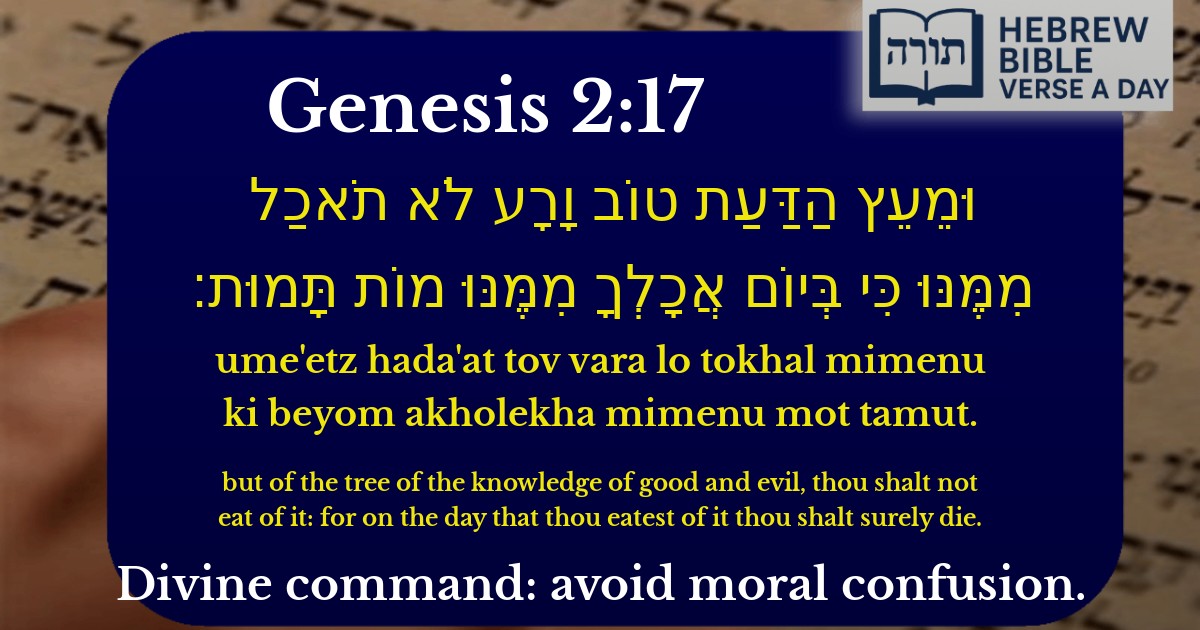Frequently Asked Questions
Q: What is the 'tree of knowledge of good and evil' in Genesis 2:17?
A: According to Rashi and other Jewish commentators, the 'tree of knowledge of good and evil' represents the human capacity to choose between right and wrong. Before eating from it, Adam and Chava (Eve) had an innate understanding of truth and falsehood, but not moral choice. Eating from it gave them free will, but also introduced the struggle between good and evil inclinations (yetzer tov and yetzer hara).
Q: Why did Hashem forbid eating from this tree if it was in Gan Eden?
A: The Rambam explains that this commandment was given to provide Adam and Chava with an opportunity to exercise free will and earn reward through obedience. By having one clear prohibition, they could demonstrate their commitment to Hashem's will. The Midrash teaches that this test was essential for human growth and the development of moral responsibility.
Q: What does 'you shall surely die' mean in Genesis 2:17? Did Adam die that day?
A: Rashi explains that 'you shall surely die' refers to spiritual death (separation from Divine connection) beginning that day, leading to eventual physical death. While Adam didn't die physically that day (he lived 930 years), his spiritual perfection was diminished. The Talmud (Sanhedrin 38b) discusses how Adam's lifespan was shortened from what it might have been.
Q: How does this verse relate to us today?
A: This verse teaches fundamental Jewish concepts: 1) Humans have free will to choose between good and evil (Rambam, Hilchot Teshuvah), 2) Our actions have consequences, and 3) Following Hashem's commandments leads to life. The Sages see this as the foundation for all mitzvot - that we must sometimes restrain our desires to fulfill G-d's will.
Q: Why was the punishment so severe for eating from this tree?
A: The Midrash explains that as the first commandment given to humanity, its violation had profound consequences. Adam was created on a very high spiritual level, so his sin caused a greater 'fall.' The Maharal teaches that this wasn't just about fruit, but about the fundamental choice whether to subordinate human will to Divine will - a choice that affects all generations.


The Prohibition of the Tree of Knowledge
The verse (Bereishit 2:17) states: "וּמֵעֵץ הַדַּעַת טוֹב וָרָע לֹא תֹאכַל מִמֶּנּוּ כִּי בְּיוֹם אֲכָלְךָ מִמֶּנּוּ מוֹת תָּמוּת" ("but of the tree of the knowledge of good and evil, thou shalt not eat of it: for on the day that thou eatest of it thou shalt surely die"). This commandment is central to understanding the test of Adam and Chava (Eve) in Gan Eden.
Rashi's Explanation
Rashi (Bereishit 2:17) explains that the phrase "מוֹת תָּמוּת" ("thou shalt surely die") implies a double death—both physical death and spiritual death. He notes that Adam was originally created to live eternally, but this transgression introduced mortality into the world. The punishment was not immediate death on that very day, but rather the introduction of the process of dying, as Adam lived for many years afterward (Bereishit 5:5).
Rambam's Perspective
In Moreh Nevuchim (1:2), Rambam discusses the nature of the Tree of Knowledge. He suggests that the tree symbolizes the human capacity for moral discernment—before eating from it, Adam and Chava operated purely on intellectual truth (emmes and sheker), but afterward, they gained subjective moral judgment (tov and ra). The prohibition was thus a test of obedience to Hashem's command over their own reasoning.
Talmudic and Midrashic Insights
The Nature of the Punishment
The phrase "בְּיוֹם אֲכָלְךָ מִמֶּנּוּ מוֹת תָּמוּת" is interpreted in Pirkei DeRabbi Eliezer (13) to mean that Adam was sentenced to death on that day, but Hashem, in His mercy, delayed its execution. This reflects the principle of divine justice tempered with compassion.
Philosophical Implications
The Maharal (Gur Aryeh) explains that the Tree of Knowledge represented the blurring of pure intellect with human desire. Before eating, Adam perceived reality objectively; afterward, his perception became clouded by personal bias. The prohibition was thus a safeguard for spiritual clarity.